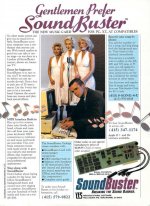GeoffB17
Veteran Member
OK, on that basis, I'll accept the MT-32.
Note, I have a Roland LAPC-I card in one of my older PCs - this is a sort of 'built-in' MT-32, in that it's very similar in most midi regards (actually it's closer to the CM-32, a successor to the MT-32).
I understand that back then, some PCs were sold as a 'games' package, including the MT-32 and the connecting (MPU-401) card.
Sierra (On-Line ?) were very involved wih the MT-32, most of their games had very strong support for the MT, and I think they also did packages of game + MT-32 (and PC as well ?).
There are sites now releasing files of the music/midi for Sierra games. They do GM versions as well, but the specific MT-32 versions are 'The Real Thing'. If I download the MT versions, I can play them via my LAPC card. Some are really pretty good musically. I found one game where the music files were composed by Jan Hammer (Police Quest 4 ?). Many of the midi composers created unique sounds to be uploaded to the MT-32 to replace ROM sounds.
Geoff
Note, I have a Roland LAPC-I card in one of my older PCs - this is a sort of 'built-in' MT-32, in that it's very similar in most midi regards (actually it's closer to the CM-32, a successor to the MT-32).
I understand that back then, some PCs were sold as a 'games' package, including the MT-32 and the connecting (MPU-401) card.
Sierra (On-Line ?) were very involved wih the MT-32, most of their games had very strong support for the MT, and I think they also did packages of game + MT-32 (and PC as well ?).
There are sites now releasing files of the music/midi for Sierra games. They do GM versions as well, but the specific MT-32 versions are 'The Real Thing'. If I download the MT versions, I can play them via my LAPC card. Some are really pretty good musically. I found one game where the music files were composed by Jan Hammer (Police Quest 4 ?). Many of the midi composers created unique sounds to be uploaded to the MT-32 to replace ROM sounds.
Geoff

